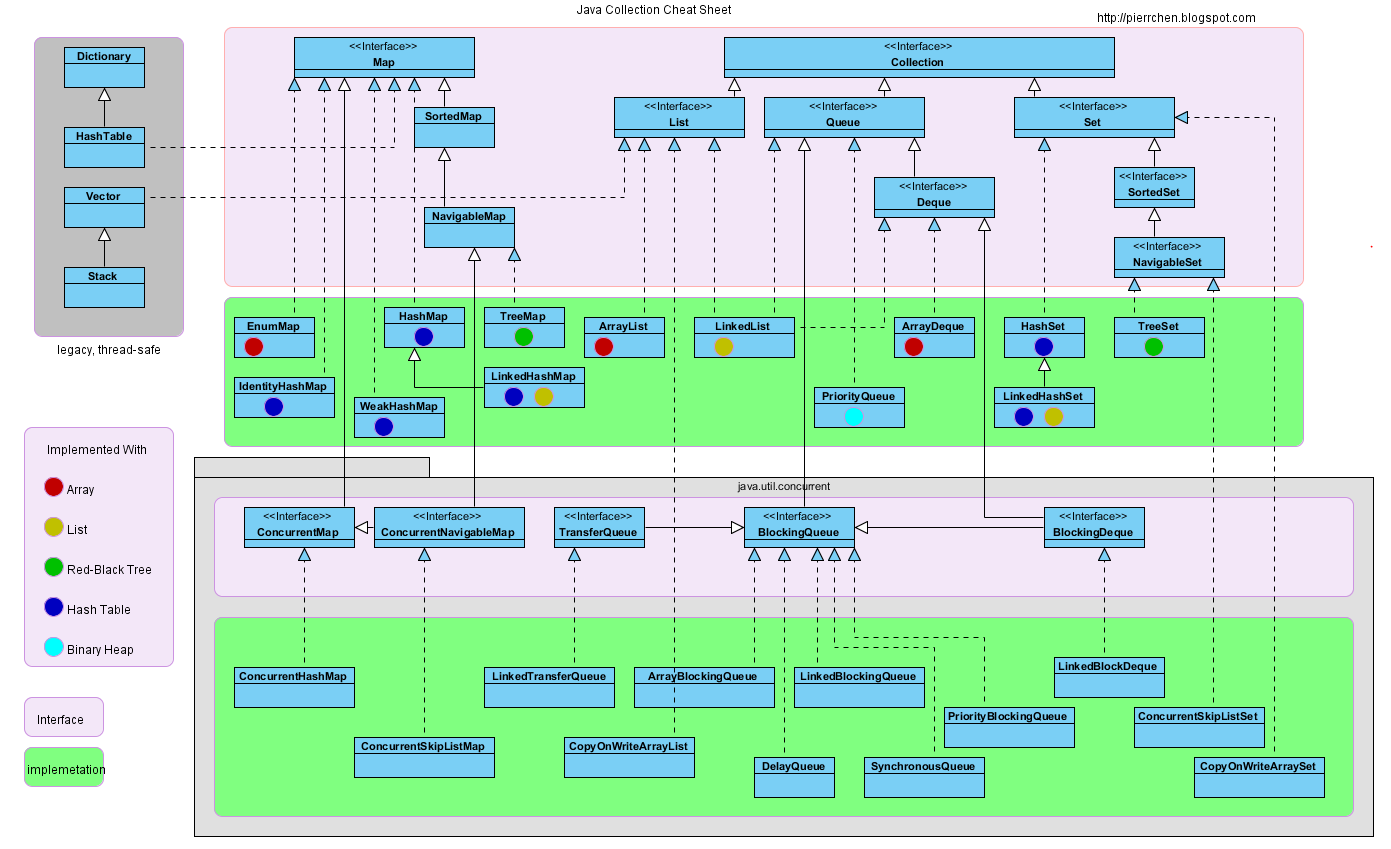Thursday, April 30, 2015
HashMap internal implementation in Java
Below link provides good explanation about this topic.
http://javarevisited.blogspot.in/2011/02/how-hashmap-works-in-java.html
http://javahungry.blogspot.com/2013/08/hashing-how-hash-map-works-in-java-or.html
http://javarevisited.blogspot.in/2011/02/how-hashmap-works-in-java.html
http://javahungry.blogspot.com/2013/08/hashing-how-hash-map-works-in-java-or.html
HashSet internal implementation in Java
HashMap.put method will return
oldValue: if key is already present, then it will overwrite the value and returns old value
null: if key is not present, then it will add this key,value pair and then returns null.
In case of HashSet, internally it has a hashmap. When we call add method it will call 'put' method of the hashmap and if put method returns null means new entry is added into hashmap and hashset
more at: http://javahungry.blogspot.com/2013/08/how-sets-are-implemented-internally-in.html
oldValue: if key is already present, then it will overwrite the value and returns old value
null: if key is not present, then it will add this key,value pair and then returns null.
In case of HashSet, internally it has a hashmap. When we call add method it will call 'put' method of the hashmap and if put method returns null means new entry is added into hashmap and hashset
more at: http://javahungry.blogspot.com/2013/08/how-sets-are-implemented-internally-in.html
Java example of impementing equals, hashCode, compareTo, toString methods
Source: Java Official website
import java.util.*; public class Name implements Comparable{ private final String firstName, lastName; public Name(String firstName, String lastName) { if (firstName == null || lastName == null) throw new NullPointerException(); this.firstName = firstName; this.lastName = lastName; } public String firstName() { return firstName; } public String lastName() { return lastName; } public boolean equals(Object o) { if (!(o instanceof Name)) return false; Name n = (Name) o; return n.firstName.equals(firstName) && n.lastName.equals(lastName); } public int hashCode() { return 31*firstName.hashCode() + lastName.hashCode(); } public String toString() { return firstName + " " + lastName; } public int compareTo(Name n) { int lastCmp = lastName.compareTo(n.lastName); return (lastCmp != 0 ? lastCmp : firstName.compareTo(n.firstName)); } }
Java purpose of AtomicInteger
We can use AtomicInteger to avoid count++ issue in mutli-threading environment.
AtomicInteger provides incrementAndGet() and decrementAndGet() methods which are thread safe.
With use of AtomicInteger, we can solve this problem without using synchronized keyword
more: https://docs.oracle.com/javase/tutorial/essential/concurrency/atomicvars.html
http://javarevisited.blogspot.in/2012/01/how-to-write-thread-safe-code-in-java.html
AtomicInteger provides incrementAndGet() and decrementAndGet() methods which are thread safe.
With use of AtomicInteger, we can solve this problem without using synchronized keyword
more: https://docs.oracle.com/javase/tutorial/essential/concurrency/atomicvars.html
http://javarevisited.blogspot.in/2012/01/how-to-write-thread-safe-code-in-java.html
Friday, April 24, 2015
Find the smallest positive integer value that cannot be represented as sum of any subset of a given array
Question Details:
Given a sorted array (sorted in non-decreasing order) of positive numbers, find the smallest positive integer value that cannot be represented as sum of elements of any subset of given set.
Expected time complexity is O(n).
more: http://www.geeksforgeeks.org/find-smallest-value-represented-sum-subset-given-array/
Solution Explanation:
http://stackoverflow.com/a/21078133/4507251
Given a sorted array (sorted in non-decreasing order) of positive numbers, find the smallest positive integer value that cannot be represented as sum of elements of any subset of given set.
Expected time complexity is O(n).
Examples:
Input: arr[] = {1, 3, 6, 10, 11, 15};
Output: 2
Input: arr[] = {1, 1, 1, 1};
Output: 5
Input: arr[] = {1, 1, 3, 4};
Output: 10
Input: arr[] = {1, 2, 5, 10, 20, 40};
Output: 4
Input: arr[] = {1, 2, 3, 4, 5, 6};
Output: 22
more: http://www.geeksforgeeks.org/find-smallest-value-represented-sum-subset-given-array/
Solution Explanation:
http://stackoverflow.com/a/21078133/4507251
Websites to learn Algorithms, Data Structures and Java
For learning algorithms and data structures, please follow below links.
Will update more.
Subscribe to:
Comments (Atom)
